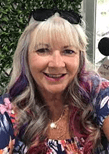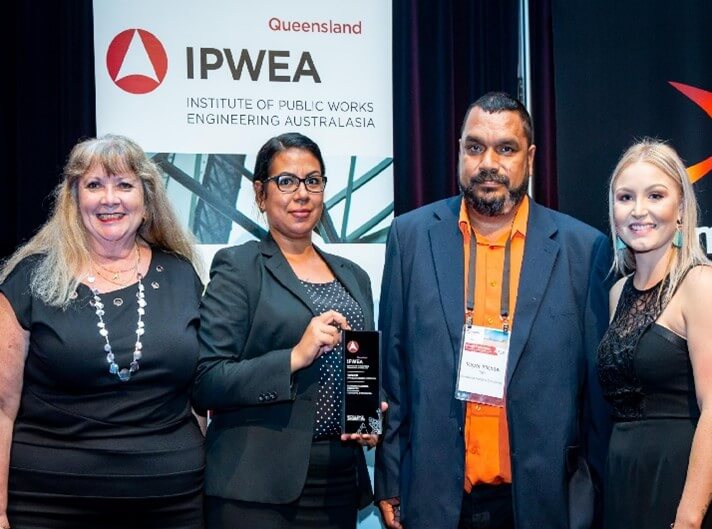Daria’s Perspective – February 2022 – Client Spotlight: Jacqui Cresswell – CD
Daria’s Perspective
Client Spotlight:
Jacqui Cresswell, Executive Manager Roads, Infrastructure & Essential Services of Kowanyama Aboriginal Shire Council

By Daria Campbell
“Jacqui is a very valuable member of our Executive team and through her drive and tenacity has helped reform the roads and infrastructure function, helped expand local business opportunities and helped secure significant increases in funding for major additional building and infrastructure projects for the community.” Gary Uhlmann Chief Executive Officer Kowanyama Aboriginal Shire Council
Q: How long have you been with Kowanyama Aboriginal Shire Council?
A: I started as a Grants Manager and then became Acting Executive Manager then Executive Manager of Roads, Infrastructure & Essential Services and I have acted in the CEO role. I have been with Kowanyama for over 6 years. I was brought on board because of my Grants background and ability to obtain funding, because of my broad knowledge base of Council operations, I covered many leave and vacant roles as they arose. I also had a large hand in the 10-million-dollar projects that helped with critical infrastructures to be upgraded in the Kowanyama area such as their sewage, water, dumps and refuse centre. I played a big part in getting these services to the state of the art facilities they are now.
Q: When do you feel your career began?
A: I started at Cairns Regional Gallery as Administrator and gained respect and passion for Indigenous people during this time. After leaving this position Precruitment got me a role at Napranum Aboriginal Shire Council where I was able to get funding for the redevelopment project for their Esplanade and for the new Council Chambers. After leaving this position, and travelling the world, I then went to Kowanyama where I helped get funding for the park and football field. I also gained funding for the new state of the art Airport Terminal previously it was just a shed with 2 toilets. These facilities are taken for granted by people in the southern areas of Queensland.
Q: What did you learn from the early days of your careers and what have been some of the struggles you have faced?
A: I have found that the people who make the decisions on funding for Remote Councils have no idea about the isolation of the communities (most of these people live in Canberra or Brisbane). People in these communities are stranded during the wet season, so they need basic facilities to live and survive during those times. My biggest struggle is making those funding bodies aware that remote communities are special and unique. For instance, funding for Townsville would be completely different from funding for Kowanyama, based on their needs.
Another struggle in this role is that the leadership is male-dominated. I have a Diploma in Project Management but as a woman, talking about infrastructure and knowing what things cost, the ability to work with contractors and designers while keeping it all under budget, it took a long time for people to take me seriously.

Q: Is there anything in your career so far that you are proud of achieving?
A: In 2018 Kowanyama Aboriginal Shire Council achieved Excellence in Public Works. We took out the award for Design and Construction of Public Works Projects Under $2 million at the Institute of Public Works Engineering Australasia, Queensland (IPWEAQ) Excellence Awards. The awards recognise private and public organisations and individuals who have demonstrated best practices, innovation and positive community impact in public works projects across Queensland. Kowanyama Aboriginal Council collected the award for design and construction for the Kowanyama Social Precinct. Kowanyama Social Precincts include a full-size football oval featuring change rooms, toilets and a kiosk. There is also a skate park, playground area featuring BBQ and picnic facilities, swimming pool (previously there but unused), ride safe bike path and basketball court.
This award meant a lot to me and showcased my hard work while at Kowanyama plus it was the first time any Aboriginal Council had won an award with IPWEAQ.
Q: What do you think the most important attributes of being a leader is?
A: I never ask people to do things I would not be willing to do myself. I like to lead by example and I believe in a fair day’s work for a fair day’s pay. Also being a good listener and working with people and through people while having an open-door policy with no judgments.
Q: What advice would you give to a young woman who is thinking about getting into your field?
A: Work hard. Learn as much as you can both in academics and on the job training. Look outside for other avenues, especially the way the world is right now and look to diversify yourself as much as possible. Steering away from mainstream roles like administration. These were the only roles available when I was just starting out, but that is not the case any longer. Look at building and essential services roles which are now open to women like working in roads and transport, infrastructure, and rangers. There are a lot more female Mayors and CEOs than in the past but my hope is that we keep striving to see more women in these positions of leadership.



